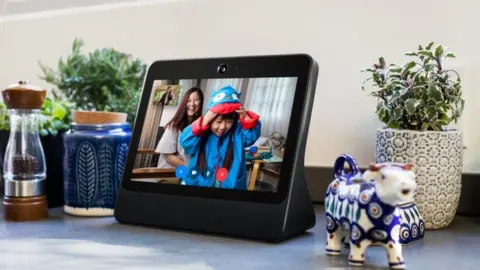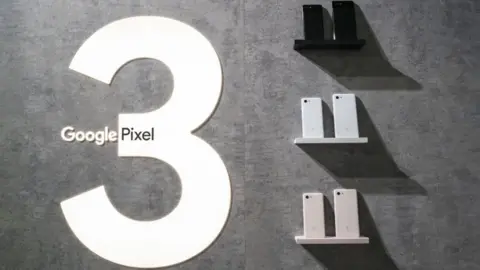Tech Tent - Facebook and Google’s hardware challenge
 Reuters
ReutersThey've built two of the world's most powerful and wealthy businesses on the back of their software expertise but this week Facebook and Google unveiled hardware products. On Tech Tent we ask whether the two Silicon Valley giants can persuade consumers to pay for devices when they are used to getting their services for free.
When Facebook unveiled its Portal video chat screen, whose camera follows you around the room, the first reaction of many people - including me - was "Really?!"
If you've read Dave Eggers' novel The Circle about a social media business which wants its users to share everything about their lives - "sharing is caring" - Portal will sound like the ultimate realisation of that nightmare vision.
Coming so soon after Facebook's latest data breach, it might seem the worst possible time to launch what is, in effect, a listening and viewing device for the home.
But Andrew Bosworth, the executive running Facebook's hardware division, tells us the company understands the challenge: "From the very beginning we knew that [when] introducing a new product category into people's homes you have to put privacy first."
He points to the cover for the camera when it is not in use, and to the fact that any data is processed locally on the device, rather than being sent off to Facebook's servers.
Pressed on whether Portal users will end up seeing marketing messages he insists that isn't part of the plan: "We have no plans to add advertising to this and we have no ambition to make money on this piece of hardware right now."

Which kind of begs the question - what is it for? Will the kind of people who currently use Skype or Apple's FaceTime to keep in touch with family and friends really want a separate screen that does much less than a smartphone or tablet?
Patrick Spence, chief executive of smart speaker firm Sonos, is dubious.
"People are getting a bit of screen fatigue," he tells us, believing that we are looking for something that makes our TVs, tablets and phones talk to each other better rather than adding yet another screen.
Similar questions about privacy and usability hovered over the week's other hardware launch. Fresh from shutting down its social network Google+ after discovering a security vulnerability, the search giant unveiled its latest Pixel smartphones and the Google Home hub.
This takes the Google Home smart speaker and gives it a screen but, unlike Facebook's Portal, no camera. And once more the company looks to be playing catch-up with Amazon, whose Echo Show and Spot devices have been out for a while.
 Getty Images
Getty ImagesPerhaps more important to Google as a vehicle to show off its Android platform is the latest version of its Pixel smartphone. The first two won rave reviews, in particular for the camera, but negligible sales - by one measure it has got under 0.2% of the smartphone market.
Now the Pixel 3 promises even better photos, but apart from an ugly notch on the XL model, it will look like any other smartphone to the casual observer - yet it has a price tag which puts it at the luxury end of the market. So don't be surprised if, yet again, the Pixel ends up as an also-ran in the smartphone stakes.
Google has always had a dilemma - it wants to show it can make a compelling device but has to be careful not to antagonise giants like Samsung and Huawei which are vital for the health of the Android platform.
Setting the right price, dealing with a global supply chain, getting the right marketing messages to customers are all essential skills for firms making consumer devices - not so much in building a search engine or a social network. Both Facebook and Google are finding that hardware is, well, hard.
